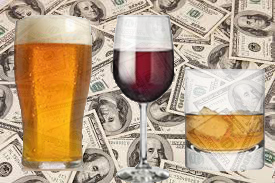Blog
Search
Industry Attempts to Quash Effective Public Health Policy, a.k.a. Alcohol Taxes
- Details
- Created: Thursday, April 23 2015 16:38

Calls for state and federal alcohol tax increases, and new contributions to decades of research showing that higher taxes reduce harm, have met the usual industry tactics to distract, intimidate, and otherwise thwart efforts to implement even the smallest of alcohol tax increases. Alcohol industry lobbyists and PR spinners have been in full force to dominate public conversation about alcohol taxes in the U.S. For instance:
- As it has done each year since 2009, beer producers such as A- B InBev and MillerCoors (with trade groups Beer Institute & Brewers Association) proposed cuts to the federal beer tax in 2015 to preempt any potential proposals to raise them. Aggressive lobbying to support alcohol tax reductions is ongoing. Meanwhile, the federal beer tax rate has lost 57% of its real value since last increased in 1991, costing the government billions in lost revenue each year.
- A recent peer-reviewed study showed conclusive evidence that a modest alcohol tax increase in Illinois significantly reduced drink-driving fatalities, and suggested the potential for an alcohol tax increase to save thousands of lives nationwide. The Distilled Spirits Council of the United States (DISCUS) immediately deployed a panicked press release attempting discredit the evidence.
- Industry trade groups immediately ran after a recent Washington Post post about how cheap alcohol has become (at its most affordable in more than 30 years), with their argument that Joe 6-pack couldn't afford his beer after a long workday if a modest tax increase were implemented. Yet recent research shows that the average moderate drinker would pay less than $30 per year under a 25-cent-per-drink tax increase. And if alcohol companies really cared about the financial life of regular Joes and Jills, why would they cut their jobs ?
These tactics are business as usual for Big Alcohol in its fight to keep alcohol taxes artificially low, despite conclusions from public health experts that raising the price of alcohol by raising taxes is an effective policy to increase health and safety. Meanwhile taxpayers, the government, and families continue to bear the economic burden from alcohol-related harm, estimated at $223.5 billion annually and $94 billion in direct government costs.
Visit our Charge for Harm campaign page and read our fact sheets to learn more about how alcohol taxes reduce harm and related costs.
Help us hold Big Alcohol accountable for the harm its products cause.
| GET ACTION ALERTS AND eNEWS |
STAY CONNECTED    |
CONTACT US 24 Belvedere St. San Rafael, CA 94901 415-456-5692 |
SUPPORT US Terms of Service & Privacy Policy |
Copyright © 2026 Alcohol Justice. All Rights Reserved.
Joomla! is Free Software released under the GNU General Public License.


